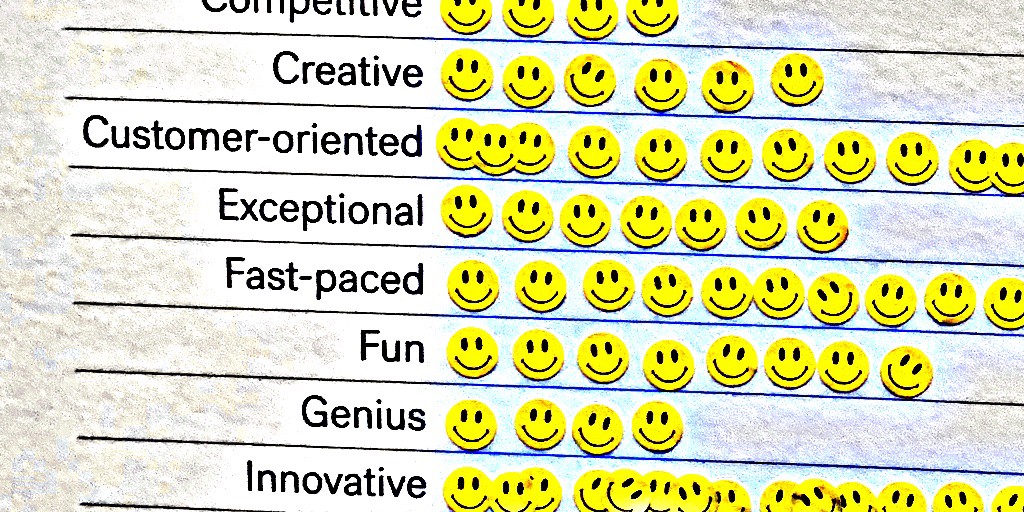Here’s what happens when you take a company culture poll at SaaStr

If you know Textio, then you know that we’re fanatical about collecting data on language and culture, especially from tech companies. So for our booth this month at the SaaStr Annual 2019 convention in Silicon Valley, we simply couldn’t resist conducting a survey of the attendees.
We put up a big poster on the expo floor and posed a fairly simple question—“How do you describe your company?”—and we asked people to vote for their favorite from a list of 21 words and phrases. Most of the options on the list ranged from the obvious (innovative) to the mundane (fast-paced), but we threw in some oddballs like brilliant and resilient to see how they would fare.
Turns out, people love voting on culture
We guessed this would be a pretty decent way to attract booth visitors, but as it turned out, the level of engagement literally went off the charts.
People took this task very seriously. We noticed many furrowed brows. Some asked if they could have more stickers. Some asked us to kindly step back and give them some room to think about it. (Okay…) One eager voter was fine with getting a single happy face, so long as they could place it precisely halfway between thought-leader and transparent. (We counted that as one vote each, sorry.)

By Day 2 voters had started desperately chain-sticking happy faces together to create more polling area beyond the edge of our poster. On Day 3 we ended up duct-taping more board to the side so people could keep voting. We didn’t want to be responsible for sparking a SaaStr riot.
So who won?
In the end, customer-oriented was the most popular vote-getter with 31 stickers, but ambitious staged a late comeback rally to get within a single happy face of a first-place tie. The rest of the top 5 was filled out by innovative (no-brainer), collaborative (maybe there’s hope for Silicon Valley yet), and best-in-class (ok, maybe not).

To be honest, there wasn’t exactly scientific rigor in the selection of the 21 terms that we decided to print on the board. We simply chose a bunch of adjectives that we had seen pop up a lot in our data and hoped they would spark some conversations around the impact of language on corporate culture. And boy, did they—especially when we showed people how the phrases they chose show up in Textio.
Face the truth about how your company sounds
Textio’s flagship product, Textio Hire, is trained on half a billion job listings and their hiring outcomes, with new data being added every month. Textio’s data-fueled brain knows exactly which phrases are working well to attract more qualified candidates, which ones aren’t, and even which phrases will statistically impact the balance of genders in your applicant pool.
As it turns out, the most popular choice for how to describe your company, customer-oriented, currently has a significant negative effect on your hiring, statistically speaking. Job postings that use this phrase will on average attract fewer people who are qualified enough to interview, and as a result it will take longer to fill the open role. The #2 word ambitious, on the other hand, currently has a positive hiring effect according to Textio’s data. That means it helps you hire better and faster, bringing in more qualified candidates and reducing your time to fill.
Who knew? Seems like being customer-focused would be a good thing for a corporate culture! The intersection of language and culture in the corporate world can be a tricky place. Sometimes phrases get overused in the workplace so much that they become corporate jargon and start to turn people off.
But it’s not always intuitively obvious whether or not a particular phrase has made the jump to the dark side. In fact, from the looks of these survey results, it’s often counter-intuitive. At the end of voting, the top 50% of people’s choices included just 1 positive phrase and 4 negative phrases, while the bottom half had 4 positive phrases and 2 negative.

As for the use of gendered language… well it’s common knowledge that Silicon Valley is notoriously sexist. But in the voting by our SaaStr Annual attendees this year, statistically gendered phrases ended up fairly evenly distributed across the ranking. At #5 was the phrase best in class, which is a term that on average increases the proportion of men over women in your candidate pool. But the word collaborative has the exact opposite effect, tending to bring in more applicants who are women, and it actually landed higher, at #4 in our survey.
Culture change starts with language
When it comes to language and corporate culture, it turns out that people at SaaStr had some pretty strong opinions. That’s probably a good thing. It’s easy to take our language choices for granted because we make them nonstop during our working lives. But when you take a look at the impact all those micro-decisions can have on your bottom line and your future growth, it’s probably worth thinking about: how does your company sound? I guess our next survey should ask “How would other people describe your company?”